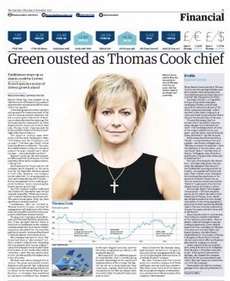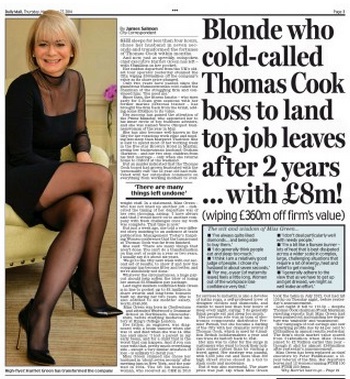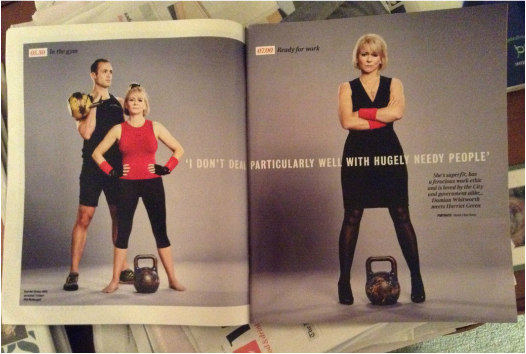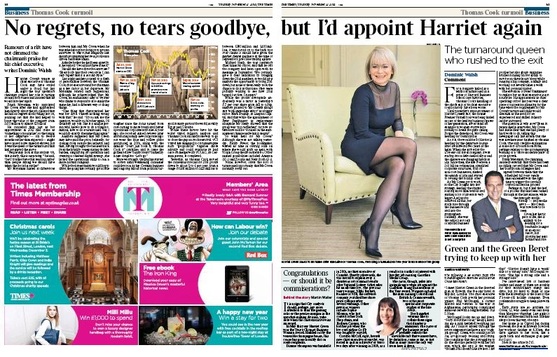This one, it seems, blagged her way into the job, cut Thomas Cook's market value by £360m in her brief stay and pocketed £8m for her trouble.
Not quite.
The departure of Harriet Green as the tour operator's chief executive is the main business story in every paper today (apart from the Daily Star). She's also on the front page of the Times, which follows up with a home news story, a business spread and a business commentary.
It is one of those counter-intuitive statistics - like the one about more Poles living in New York (it used to be Chicago) than in any city other than Warsaw - that more business people read The Times than any other national paper, including the FT. So if The Times gives Green that much space we can be sure that it's not just another here-today-gone-tomorrow, pick-up-the-payoff story.
The Mail's headline, taken piece by piece, is accurate. But it gives totally the wrong impression.
Harriet Green did email the Thomas Cook out of the blue to tell him that his company needed her. She was right. It did. She is a turnaround specialist and Cook was in a mess. It had debts of £1.6bn, its market cap was £146m and its share price had fallen to 11p.
That was in 2012. Yesterday she left the company abruptly and its share price fell by 18%, wiping - as the Mail reports - some £360m from its value (now nearly £2bn). The immediate assumption of many was that the slump was because of her departure. How would the business manage without its saviour?
Cooler heads suggested that the company results, complete with a warning note on next year's profit expectations, also announced yesterday may have had more to do with the decline.
Is this labouring the point over the headlne? Probably. And I haven't even started on the first word yet. So let's move on to the text.
She sleeps for less than four hours, chose her husband in seven seconds and transformed the fortunes of Thomas Cook within months.
And now, just as speedily, outspoken Harriet Cook has left - with £8m in her pocket.
The story is written by City Correspondent James Salmon, who sneaks quite a few businessy facts into the lifestyle narrative. The final two pars are jam-packed and along the way he tells us that Green's strategy had involved 2,500 job cuts and the closure of more than 300 travel agencies.

The paper is not renowned for its approval of women in the workplace and it tends to hold the belief that those who are successful must be strident, demanding, careless of their families and either unfeminine or glamorous wonderwomen.
Green falls into the latter category. In the Mail's book she is a fitness fanatic with a voracious work ethic who needs less sleep than Margaret Thatcher. She spends the week in a five-star London hotel away from her husband - the man she chose in seven seconds but whom she sees at their Oxford home only at weekends. She is in the gym with her former Royal Marine personal trainer at 5.30am and is a devotee of hatha yoga.
We learn her height, that she likes of diamonds and designer clothes - and that fellow board members had become frustrated by the "personality cult" that she had "cultivated with outspoken comments on everything from working mothers to overweight staff".
How much of that would we have been told had a man made a similar unexpected departure?
The bottom of the piece directs us to a commentary in the business section headlined "Why Harriet had to go" in which Associate City Editor Ruth Sutherland's admiration for Green is apparent, even while conforming with the Mail ethos:
One cannot help but wonder whether her flamboyant femininity played a part in her abrupt exit. If that is the case it would be an astonishing display of ingratitude to a woman who, in terms of commercial performance, has outshone many male executives.
Privately, sources say Green has a "highly personal style" that some found difficult to take.
Unusually for a chief executive of either sex she is open about her personal life and her family. Her departure comes just a few weeks after a jaw-dropping interview conducted in the gym of Brown's hotel, a five-star Mayfair hotel, which none of the rest of the board knew about until it appeared.
The Whitworth interview is strong - and recent - enough to have formed the backbone of most of today's coverage. All the rivals had to do was add the pejorative verbs and adjectives:
The Guardian was happy to oblige, emphasisng Green's "robust" management style and publishing more tittle tattle than the Mail: colleagues living in fear of her public humiliations; employees receiving dressings-down while her beautician gives her a manicure; "ballistic" demands of her brother, hired as a driver. Allegations which are all denied - after the mud has been thrown and stuck.
Jim Armitage in the Independent couldn't resist having Green "stomping around" in her Gucci heels.
The paper had the advantage, of course, of that Whitworth magazine special - which was equally straight down the line. (It even showed gender equality in giving us the athletic preferences of others in the Thomas Cook team, including Green's successor,)
The Times has devoted much space to the disproportionate number of women in top FT companies' boardrooms. The Mail's page three heading aside, today Fleet Street's male-dominated business departments showed that they have moved into the current century. Now all we need is for those old boardroom bores, who might tolerate a roasting from a man but definitely not from a woman, to get with the programme.







 RSS Feed
RSS Feed


